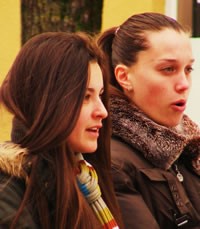Ethnic Montenegrins make up almost half of the population of the small Balkan nation of Montenegro. For three centuries the area we now know as Montenegro was under the domination of the Ottoman Empire. In 1878, Montenegro gained its independence from the Turks. Following WWII, Montenegro was one of the six republics of Yugoslavia. The citizens of Montenegro voted to be independent from Serbia in 2006. Compared to other southeastern European nations, Montenegro has done well economically since the fall of communism. Montenegro is a member of NATO and is in process of joining the European Union. Smaller groups of Montenegrins live in Serbia, Kosovo and Bosnia-Herzegovina.
A small number are in Albania. There has been migration of the various ethnic groups in this region for hundreds of years. Montenegrins have moved in and out of Albania during times of war and conquest. The most recent wave was in the 1990s when the various ethnic groups of what was then Yugoslavia were fighting. Some went to nearby Albania.
The national language of Montenegro is Montenegrin, a variety of Serbo-Croatian, a south Slavic language. The language is written in both Latin and Cyrillic script. They prefer to use the Latin script. A newly revised Montenegrin Bible became available in 2015. The Montenegrin language is nearly the same as Serbian.
Montenegrins in Albania have distinguished themselves as academics, historians, athletes, artists, and businesspeople.
The majority of the Montenegrins are members of the Eastern Orthodox Churches. There are also Muslims and non-religious Montenegrins. Most Montenegrins do not attend church services on a regular basis. They are Eastern Orthodox Christians in name only. They are married and buried in the church. Their babies are baptized into the church. Most Montenegrins are more concerned with their economic situation and family than the teachings of the Eastern Orthodox Churches.
Evangelicals have much in common with the Eastern Orthodox Church. Both believe in the inspiration of the Bible and the deity and resurrection of Jesus Christ. Unlike the Roman Catholic Church, Eastern Orthodox priests can marry. There is no pope in the Eastern Orthodox Churches. A council of bishops makes their important decisions. While evangelicals believe that one is saved by grace alone through faith in Christ, Eastern Orthodox Christians believe one is saved by one's faith and good works.
Montenegrins must understand that they can have a personal, love relationship with Jesus Christ. Christianity is more than a system of morality or family heritage. Montenegrins need to study their Bible and grow in their faith in Christ.
Ask the Lord to send loving disciple-makers to the Montenegrins in Albania.
Pray for a Christ centered revival to the Eastern Orthodox Churches in Montenegro.
Pray the Holy Spirit leads many to read and study the Montenegrin Bible.
Pray that many would tune into Montenegrin gospel radio programs.
Scripture Prayers for the Montenegrin in Albania.
wikipedia.org/wiki/Montenegro
en.wikipedia.org/wiki/Demographics_of_Montenegro
https://www.britannica.com/topic/Montenegrin-people
https://qz.com/1158964/montenegrin-the-world-has-a-brand-new-language-and-its-a-win-for-nationalists/
https://en.wikipedia.org/wiki/Serbo-Montenegrins_in_Albania
| Profile Source: Joshua Project |










